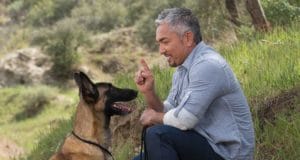There’s one thing that’s inevitable in Nature, and that’s change. There are simple and constant changes, like sunrise and sunset, and the turning of seasons. There are unpredictable and enormous changes, like hurricanes and forest fires.
A physicist would tell you that change is the only way we can tell which way time is passing. Put an ice cube on the table and you’ll wind up with a puddle of water, but it never works the other way around.
Now, since they’re instinctual, you’d think that dogs would be better at adapting to change than humans are — but that isn’t the case at all.
Humans are pretty adept at handling change, and it’s one area where our intellect puts us ahead of our dogs at dealing with the natural world. We can understand what’s changed and why, and we can plan and predict and then change those plans accordingly.
Unexpected Change
Change things unexpectedly for a dog, though, and it can leave them confused, frightened, and sometimes even physically ill. And these don’t have to be big changes. Come home an hour or two late one night when you’ve established your routine, and you might find a dog that’s an anxious mess.
Depending on the dog, the tiniest of changes can completely upend their world, which is why setting and keeping to a routine is so important, especially when you first get that dog or when you’re trying to fix misbehaviors.
Why Change Affects Dogs
The reason for this is that dogs learn instinctually, and make associations between cause and effect. You’ve probably heard of the famous Pavlov’s dog — actually, dogs — trained to salivate when they heard a bell. But the reason that Pavlov decided to do that experiment in the first place was that he realized the dogs had started salivating merely on sight of him. They had learned to associate his entrance with receiving food, and were responding accordingly.
We do the same thing to our dogs constantly, whether we know it or not. Your dog may come to associate you putting on your coat with being left alone, and so learn to get anxious and clingy whenever anyone wears a coat in the house. It’s also very common for dogs to be afraid of vertical objects, like brooms leaning against walls, after something similar has fallen nearby and scared them.
In the wild, this keeps dogs alive, both by helping them to find prey and water, and to avoid danger. When they’re living in our homes, they don’t really have to do any of those things anymore, although they will. When we send them the wrong signals and create unintended associations, that’s when we set ourselves up for misbehaving dogs.
And this is also why change can be so devastating to a dog. They thought they had it all figured out as far as what happens when, and what effects happen after which causes. Change something in that chain of events, and suddenly the dog’s entire world is upended. They cannot predict what’s going to happen, and it makes them very, very nervous and unsettled.
Big Changes Can be Traumatic
Those are just little changes, too. Sleep through your alarm clock one time, and your dog will wonder what exactly is going on — now imagine the effect that big changes can have on your dog — things like adding or removing a human or canine pack member, altering your daily schedule drastically, or moving to a completely new place. These can be particularly traumatic, a lot like cutting a ship in a storm off from its anchor.
As the Pack Leader, you are your dog’s anchor, which is why it’s so important to make sure you only create the associations you want your dog to have — teach them to sit calmly before you’ll put their leash on, or go to their place when you’re leaving, or to wait before you give them their food.
At the same time, avoid giving them affection when they’re excited or misbehaving, and do not reward them when they’re frightened. Those are common mistakes that teach your dog how to do exactly what you don’t want — and your dog will learn, because that’s what dogs do.











